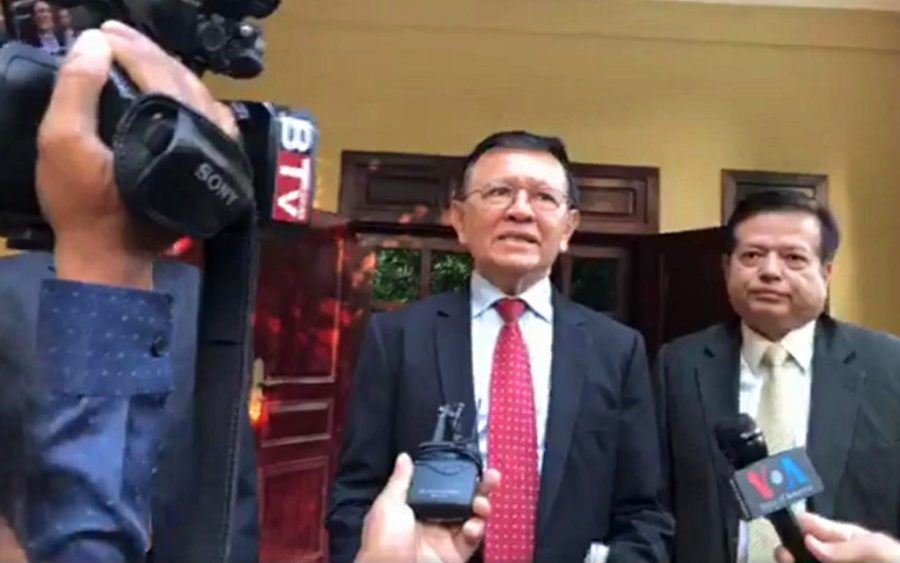Judges on Wednesday accepted additional evidence submitted by prosecutors in the trial of Kem Sokha, against the wishes of defense lawyers who earlier had questioned why new evidence was needed two and half years after the opposition leader was arrested.
Sokha, president of the dissolved opposition CNRP, is accused of conspiring with the U.S. to overthrow the Cambodian government. He faces up to 30 years in prison if convicted.
His trial, which began in January, resumed on Wednesday following a week of no hearings after prosecutors in late February had requested to submit seven video clips with transcripts as additional evidence.
Sokha’s lawyers had argued last month that if additional evidence was still needed, there was not enough to find Sokha guilty of treason.
Prosecutors and defense lawyers on Wednesday continued their previous debate for about an hour over the legality of submitting new evidence from prosecutors at this stage in the trial proceedings.
Phnom Penh Municipal Court judge Koy Sao then asked for a 10-minute break before announcing his decision about the permissibility of the evidence in question.
Sao said the penal judges decided to accept the evidence after having listened to arguments from prosecutors and lawyers for both the government and the defense, including discussion during the previous two trial sessions, as well as after consulting with penal judges.
The evidence includes a segment from U.S.-funded broadcaster Voice of America (VOA) about the formation of the CNRP in 2012 and a video from the post-election Veng Sreng Boulevard labor protests in 2013.
“Penal judges decided to accept the evidence and include it in this case file in accordance with Article 321 of the Criminal Procedure Code, which the court has properly considered, in order to find the truth,” and see if the facts support the charge, Sao said.
Evidence in criminal cases can be submitted freely and the court has the sole right to consider the value of submitted evidence, the judge added.
During the previous trial hearing, prosecutors and defense lawyers debated the meaning of the Criminal Procedure Code’s Article 321, which says that all evidence in criminal cases is admissible, unless otherwise required by law.
Prosecutors and lawyers for Sokha and the government, however, continued to argue on Wednesday over the timeline and procedure for submitting evidence.
Sokha’s defense team has repeatedly noted a lack of access to evidence produced by prosecutors and government lawyers, with both sides questioning the authenticity of documents.
Repeating an earlier argument, defense lawyer Ang Udom said in court that regardless of whether judges accepted or rejected additional evidence, submission of evidence by the prosecutor at this time meant that the prosecutor did not have enough evidence to find his client guilty.
Udom said in principle, if there is not enough evidence, the prosecutor should request that charges be dropped.
U.N. representatives in January called Sokha’s trial “tainted by irregularities,” and criticized his September 2017 arrest without a warrant, arbitrary detention and the limited public access to trial proceedings.
Officials have countered that Sokha was arrested and detained according to legal procedures, and accused him of conspiring with the U.S. to foment a “color revolution.”
The initial evidence put forward against Sokha was a video recording of a 2013 speech he gave in Australia in which the politician discusses receiving support from the U.S. since he entered politics in 1993. In the video, he says he was advised to pursue grassroots support in the model of the 2000 overthrow of Yugoslavian dictator Slobodan Milosevic.












